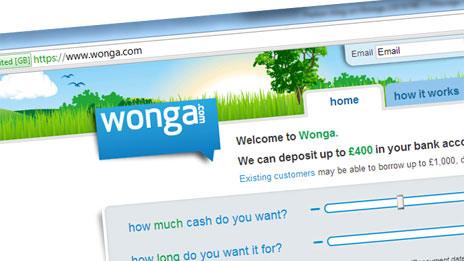The bad and good of Wonga
- Published
- comments

In many ways Wonga.com is an impressive, even admirable business (and please resist your temptation to send me hate mail - I am feeling delicate).
It is, for example, funded exclusively with equity capital, or £100m genuinely at risk of being lost if things go wrong.
So, unlike a bank, it has no depositors or creditors who can pull their money out in a panic and bankrupt it.
If all lenders were financed in this way, we wouldn't have had the banking crisis of 2007-8.
Also its technology, unlike our banks, is world class.
Wonga has written algorithms, computer programs, which determine whether you deserve to be given a loan in seconds, from looking at details about you and your behaviour, such as what email service provider you use and whether you have bothered to look at the company's terms and conditions.
The proof of the robustness of this automated credit assessment is that it rejects 60% of applicants and has a default rate on its wholly unsecured personal loans of just 7.5% - which seems remarkably low, since Wonga is by definition lending to those who have exhausted their ability to get money from conventional sources.
Nor is it possible to say that what it charges for its per-day is hard to understand.
The interest rate is 1% a day, with a £5.50 transmission charge, for loans of up to £1000. Its typical loan is £200 for 15 days.
And if you go to its home page or mobile app (and in a way I would hope you haven't found the need to do that), it is staggeringly easy to see within seconds how much it will cost you to borrow what you want for the time period that suits you.
If only bank charges were so transparent.
So any criticism of Wonga would not be that it is a risky, or poorly managed business.
Arguably, given the way it is now expanding overseas and also getting into small business loans and creating a new product a bit like a credit card, it is impressively entrepreneurial.
The case against Wonga would be that there is something wrong with an economy that creates such huge demand for its very expensive money.
Its simple 1% per day interest rate equates to an annual percentage rate of interest a touch shy of 6000%. This is very, very, good business for Wonga and its venture capital backers - and a manifestation of the powerlessness of those who borrow from it.
If you hate Wonga, you are probably railing against a world in which millions of people find themselves desperate for money in the course of a year, and have nowhere to turn but a business charging an eye-wateringly high rate of interest.
Now there are so-called payday lenders (Wonga, by the way, insists it is a short-term lender, not a classic payday lenders) which are more rapacious and less transparent than Wonga.
And maybe the investigation into their practices by the Competition Commission, which has been announced today, will rein them in to an extent.
But if you hope that investigation, or indeed regulation and supervision by the newly created Financial Conduct Authority, will somehow eliminate the market for Wonga, or indeed destroy it as a business, well you may be guilty of an admirable but unrealistic naivete.